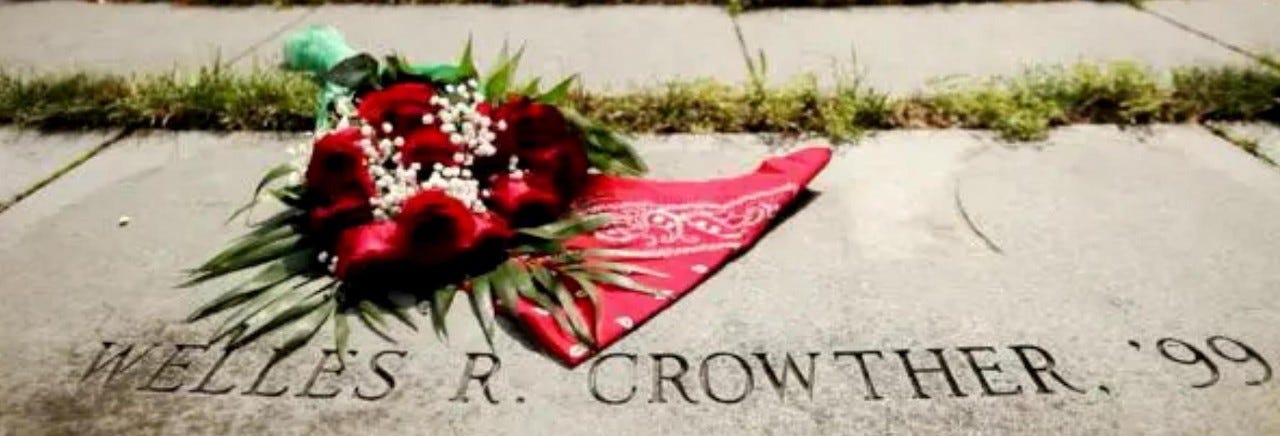We’re living in a time when our constitution and our legal rights are being aggressively violated. For months now, it’s been an exhausting parade of daily announcements and updates.
So many people and organizations are faced with choices about whether they will stand up and fight for what’s right. It takes courage. A lot of it.
I want to talk about courage. We often think of people in jobs that require it.
Firefighters, soldiers, human rights advocates and war-time journalists.
Ordinary people who become extraordinary
Yet, ordinary people have been put in situations where they have jumped into action.
Welles Crowther, a young equities trader led several groups on 9/11 from the Twin Towers to safety. Survivors he helped said they didn’t know who he was but referred to him as the man with the red bandana.
Welles wore his bandana to protect his face from smoke while helping others.
The bandana was a keepsake from his dad. The last time anyone saw him, he’d disappeared back into the building right before it collapsed. He lost his life saving others.
When Mark, my husband’s small engine plane lost power minutes after takeoff, he knew he wouldn’t make it to the closest airport.
He tried to emergency land on a suburban two lane road but there were three drivers. To avoid hitting them, he turned the plane to the right, immediately putting his own life at risk.
The turn caused the plane to become unbalanced. His right wing clipped two light poles, caught on fire, hit a concrete barrier, flipped upside down and landed face down by the side of the road.
The plane was burning with Mark in it.
A Good Samaritan happened to be driving by with his partner. He pulled over, got out of his car and ran to Mark at the crash site.
Thomas, the Good Samaritan told me later that he very quickly knew that if he didn’t try to rescue the pilot, the pilot would die.
While he ran to the plane, he thought to himself – if the pilot’s seatbelt is still fastened, I won’t be able to get him out.
When he reached the cockpit, Mark’s seatbelt miraculously melted right off him.
The cockpit window was broken open and on his first try, he pulled Mark out.
A couple mechanics from a nearby motorcycle mechanic school ran over and helped him carry Mark across the road to safety.
A few minutes later, the plane exploded.
That’s courage.
It also took courage and presence of mind for Mark to avoid hitting the drivers on the road, endangering his own life.
An empowering evening
A couple nights ago, during a book club gathering, we discussed the book, James by Pulitzer Prize Finalist Percival Everett. It’s a retelling of Huck Finn from Jim the slave’s perspective. The story brims with humanity and the unflinchingly brutal experience of slavery.
On the topic of racism, someone in our group declared that it’s not enough for one to be a non-racist as an individual but speak out against racism when you see it.
Our conversation then turned to the current climate in our country and how relevant the idea behind being anti-racist is. What we’re up against now is broader. It’s existential.
Segueing from our anti-racism topic, we discussed the need to speak up against what’s happening right now. To take action where we have control to help and to do the right thing. It was an empowering moment.
What would I do? What would you do?
It’s been more than five years since the fateful day of Mark’s plane accident. I often think back and wonder what was going on through his mind that day.
What would I do?
All I think about is how panicked I’d be. But I never wanted to be a pilot.
Unlike Mark who loved flying, the idea of flying a plane scared me.
Sometimes, we witness a situation as a bystander rather than something terrible happening to us.
I think of how immediate Thomas’ reaction was by swinging into action when he saw Mark in his burning plane.
When life handed them a life or death situation, neither he nor Mark had time to think about what they might do. It took presence of mind to shift into action to protect others and survive. The same could be said for Welles, the man with the red bandana.
The rest of us may never find ourselves in a physical emergency. But we face choices about what we say and how we act in these chaotic and unsettling times.
A friend once mused out loud – if I were a bystander like Thomas on the day of Mark’s plane crash, what would I do?
Would I rescue Mark or would I hold back?
Thomas said to him - if it happened again, no question I’d help someone in danger.
Our friend very honestly admitted that he wouldn’t know until he was put in the situation.
That situation is now.







A very powerful call to action. Thank you!